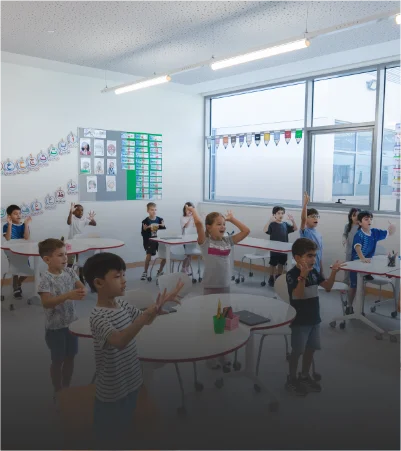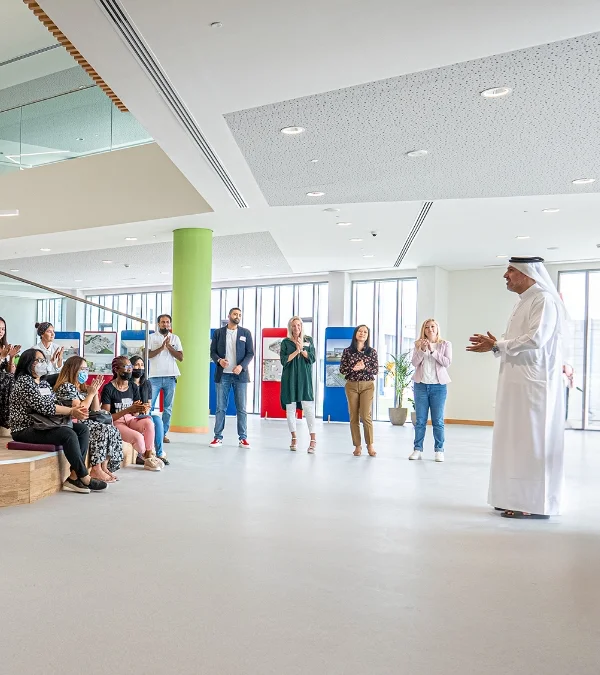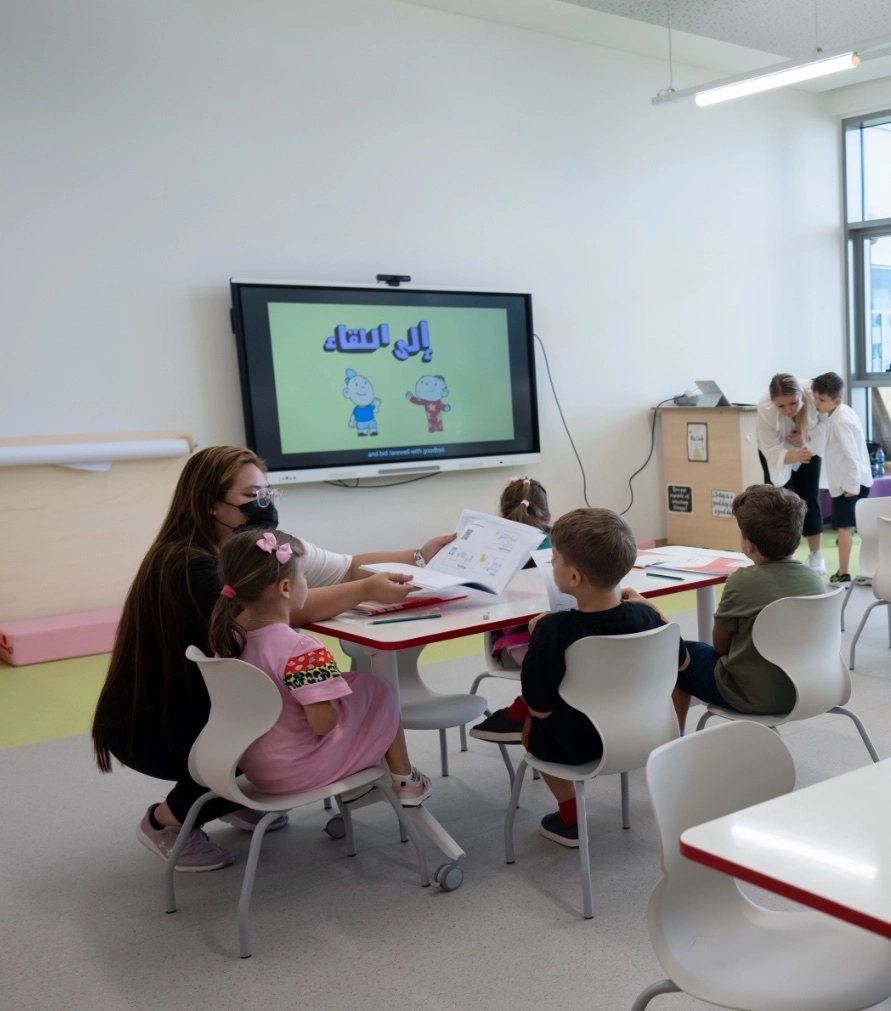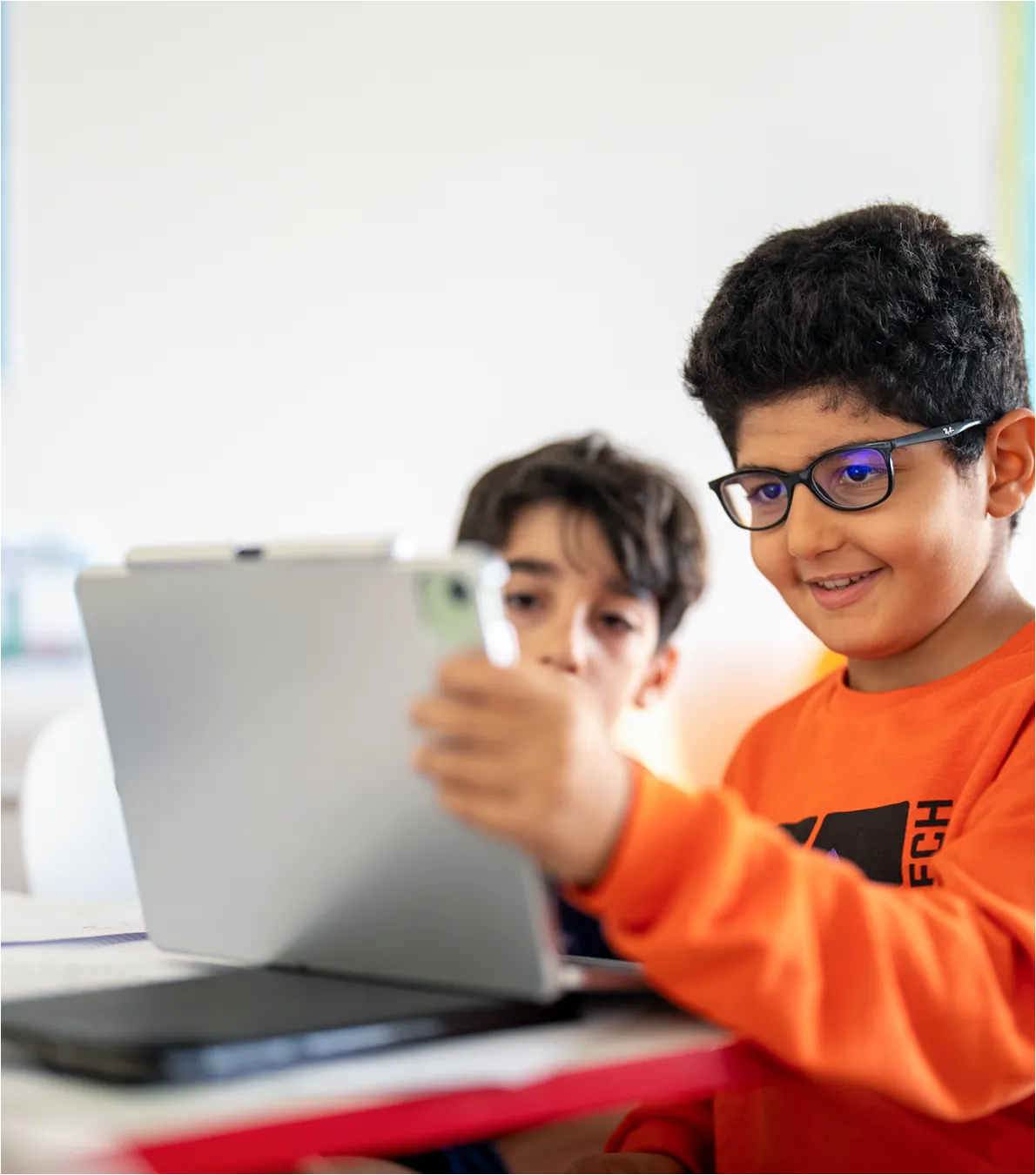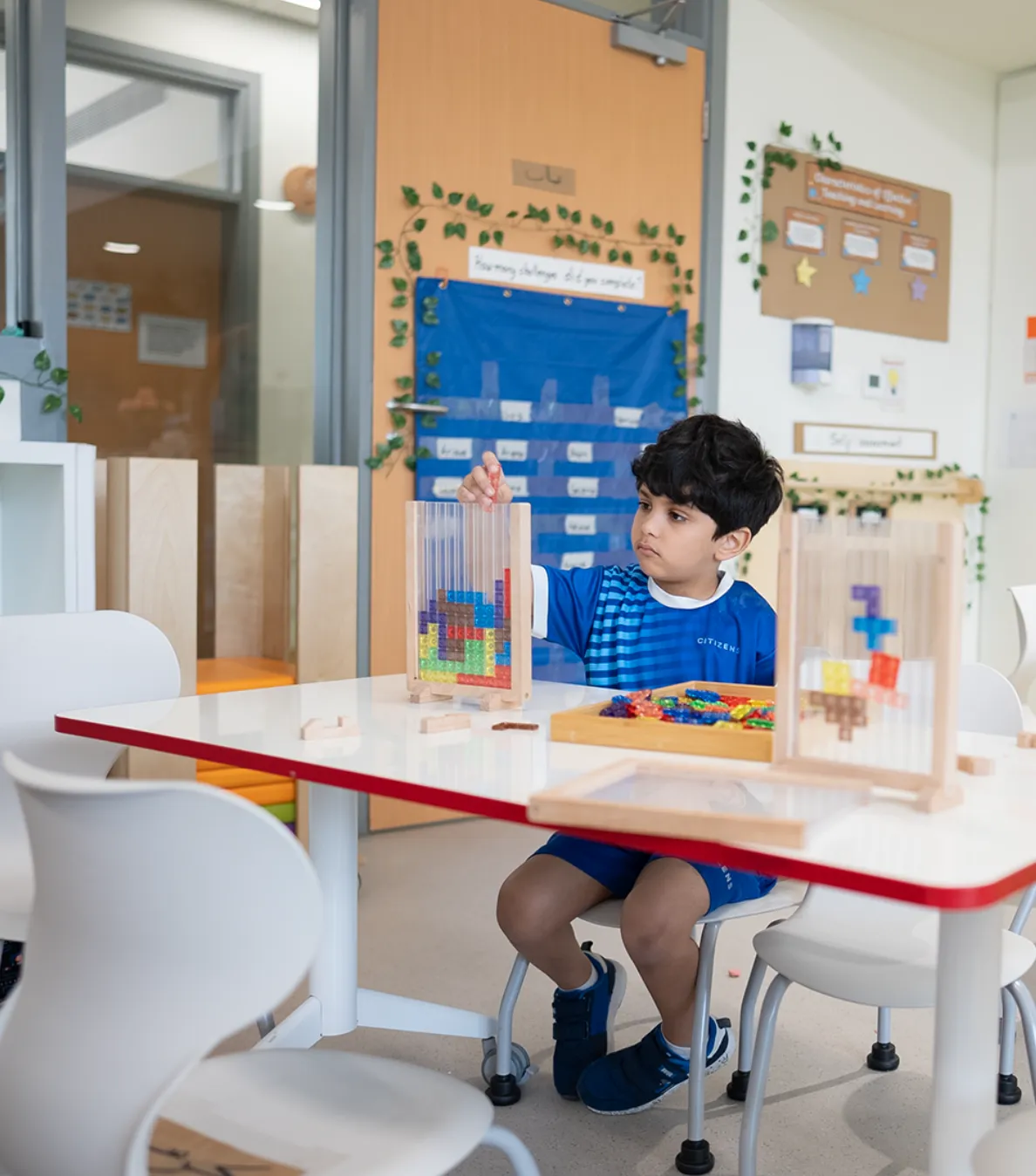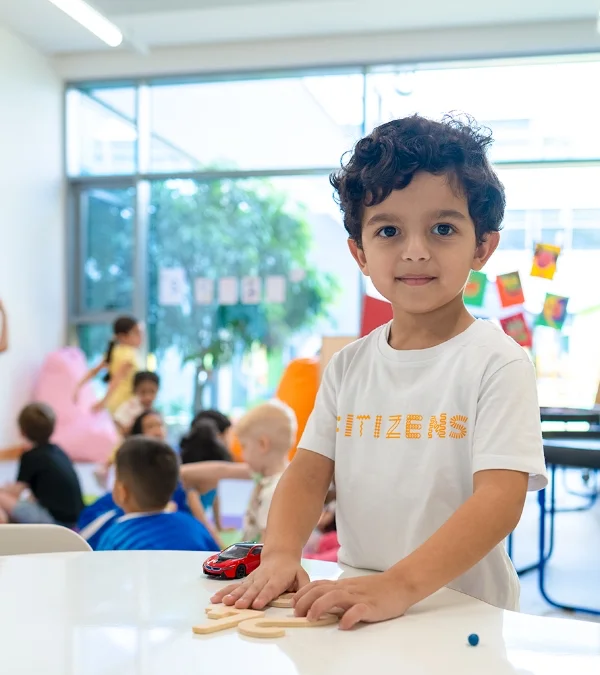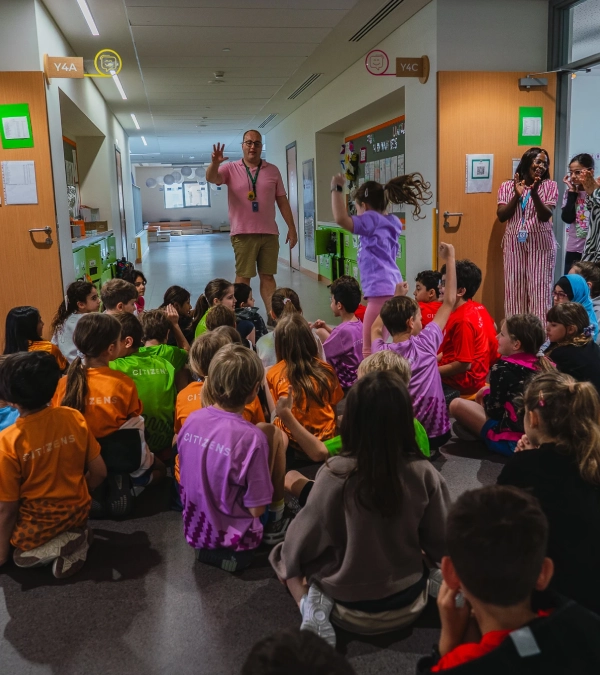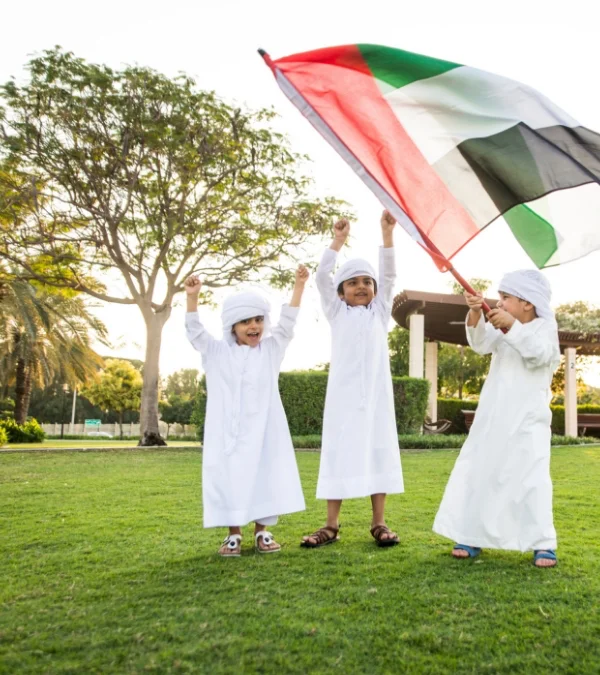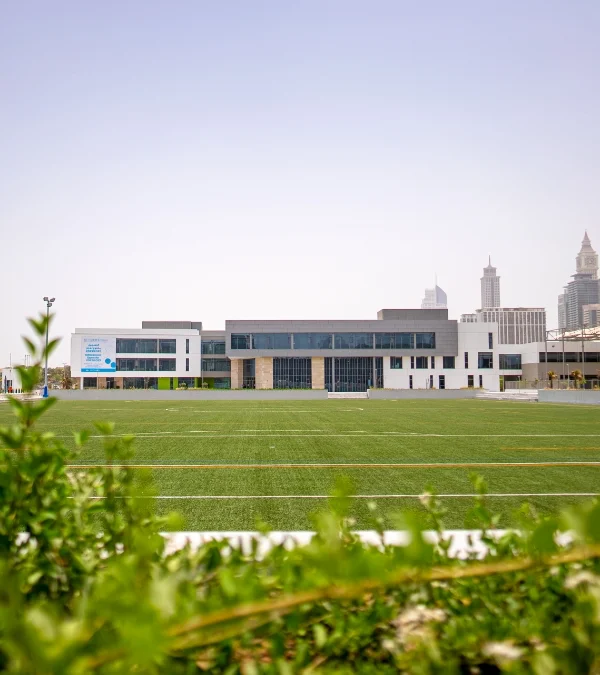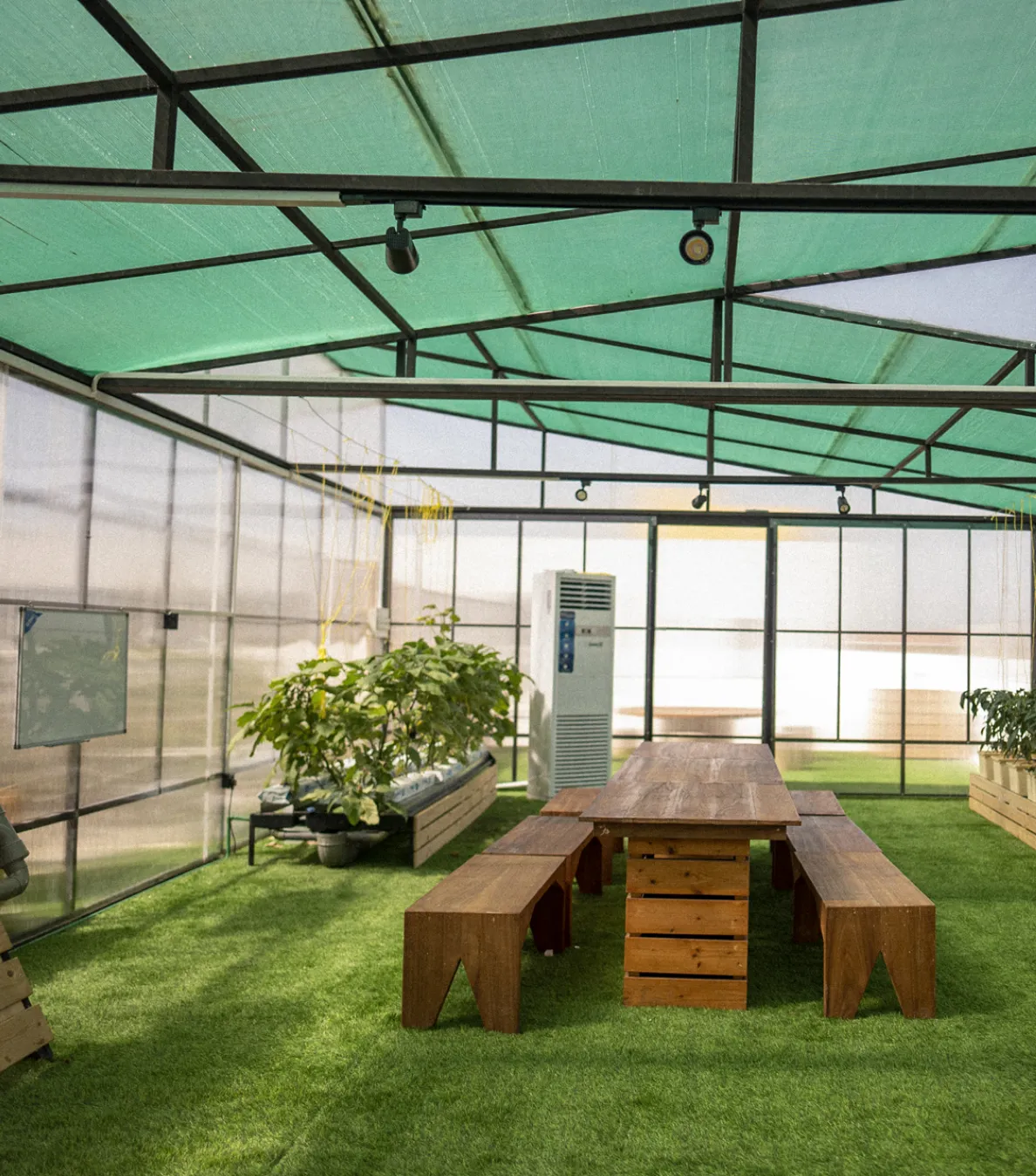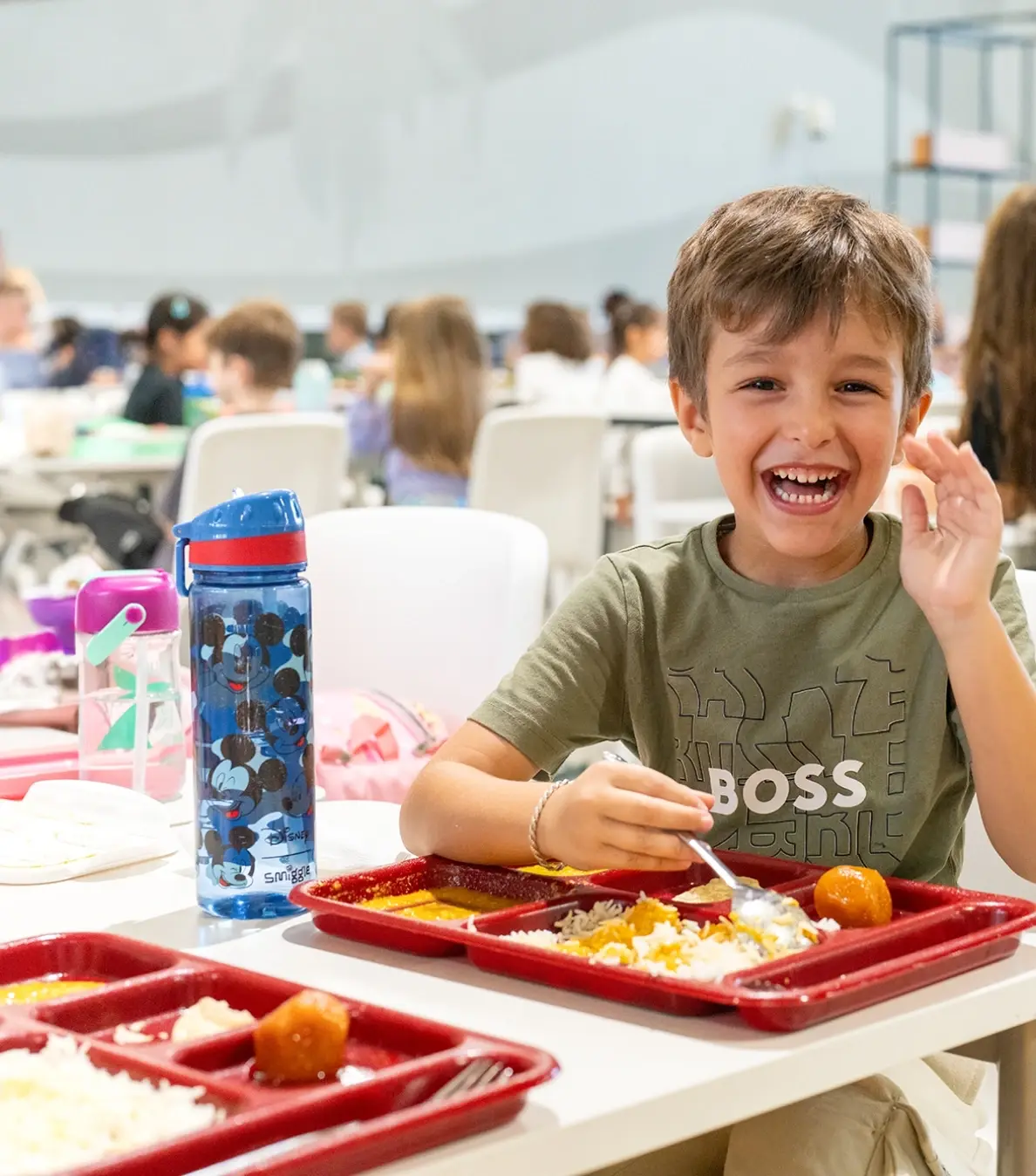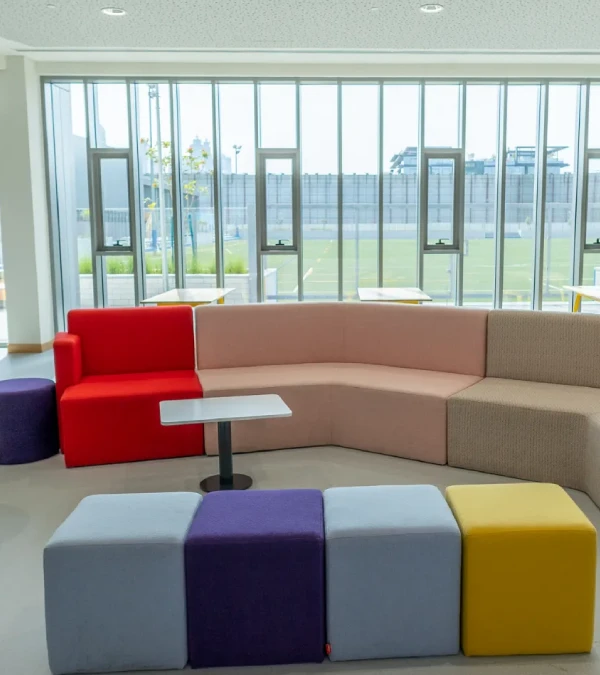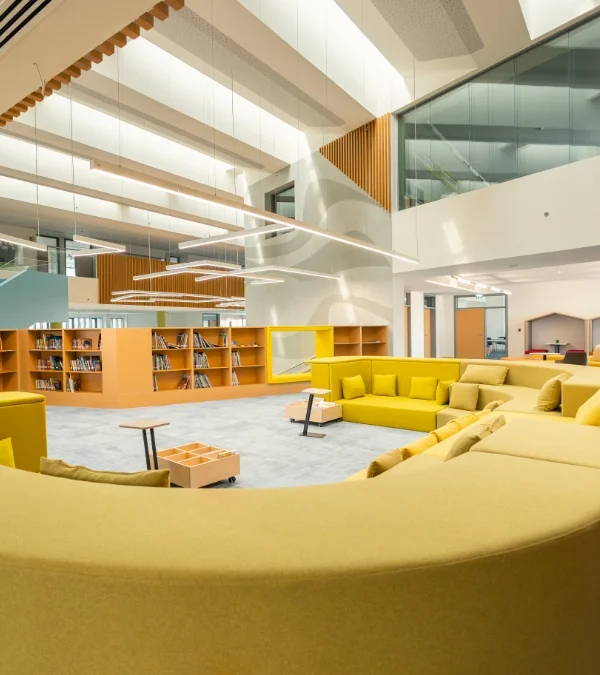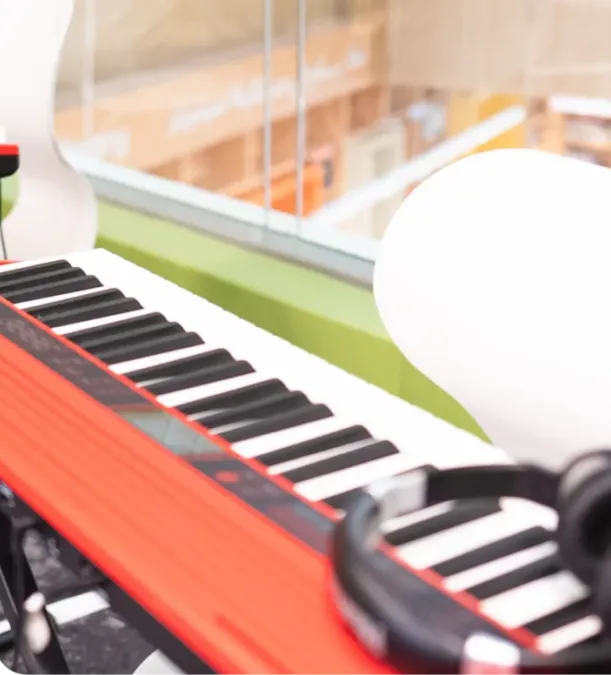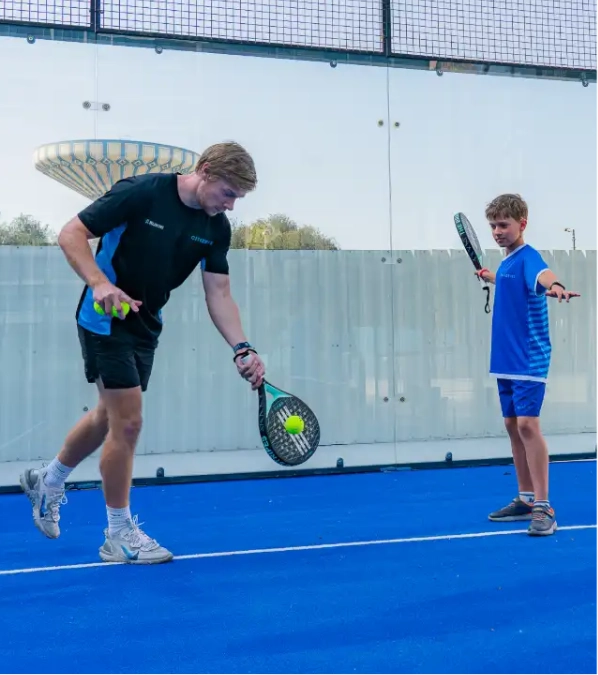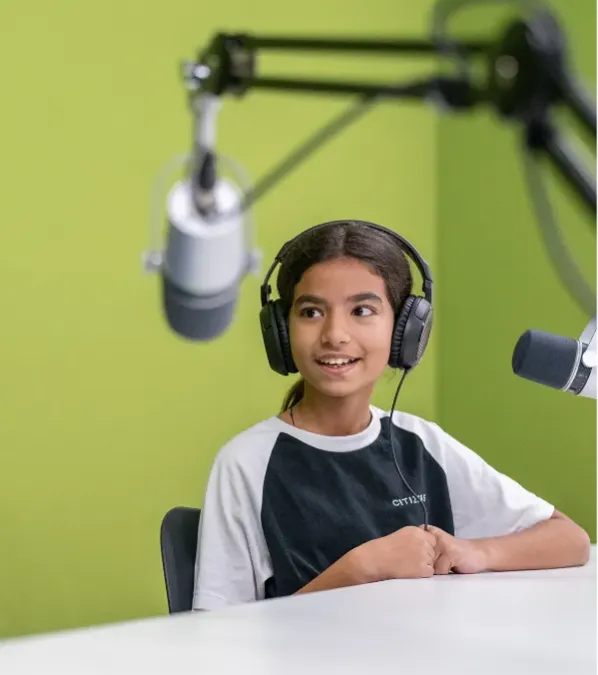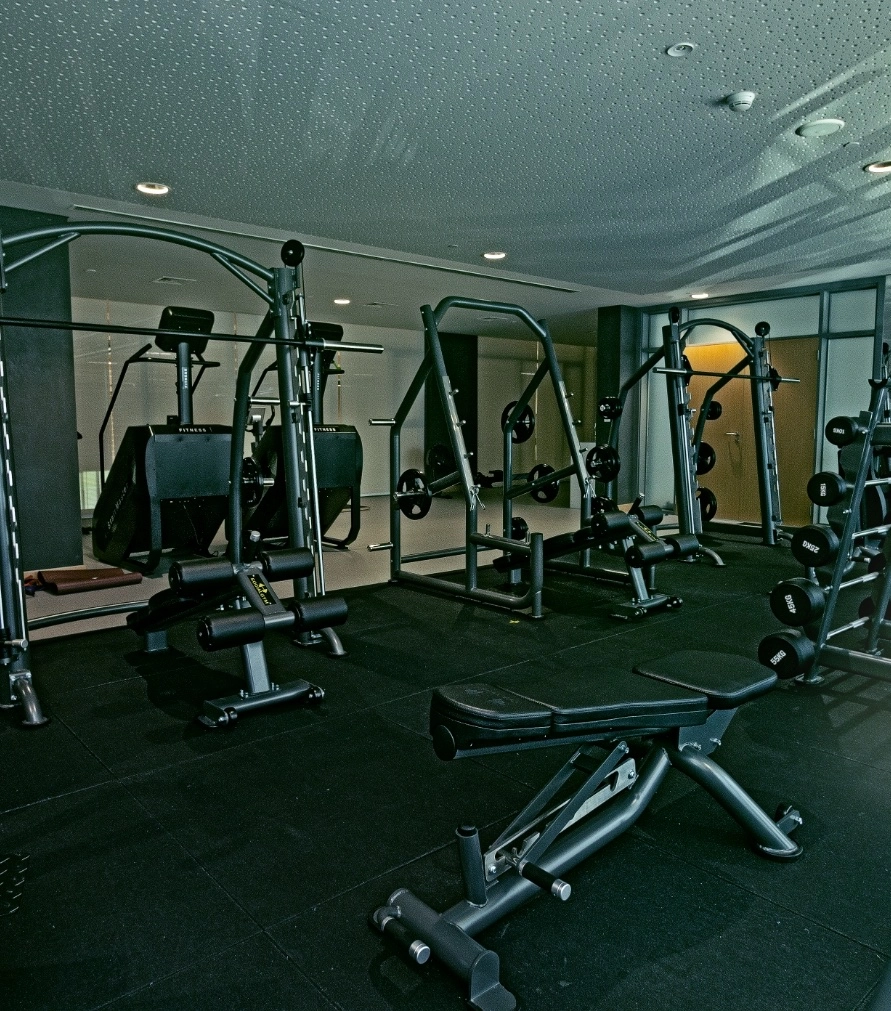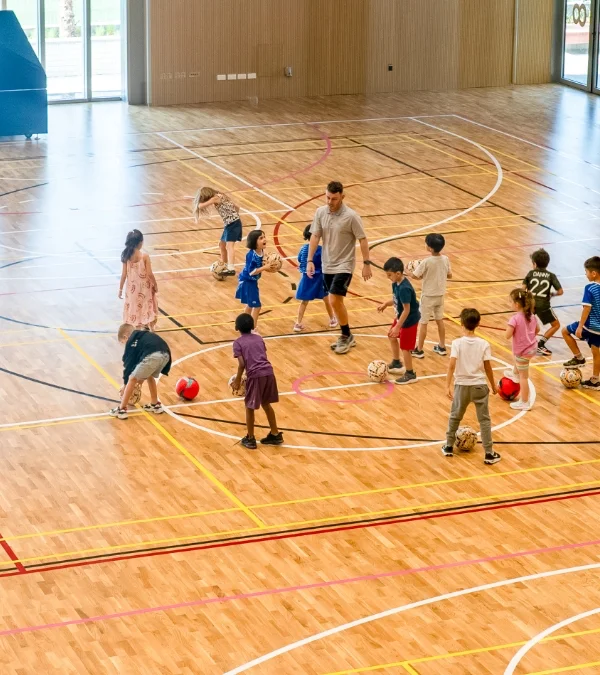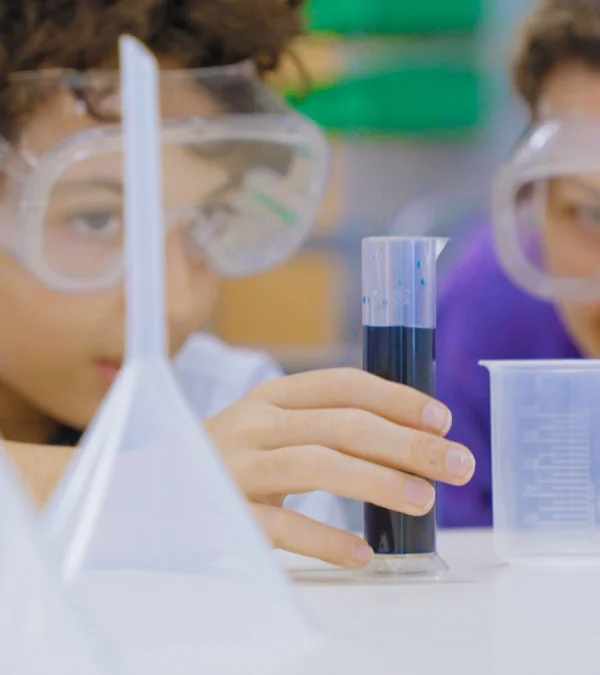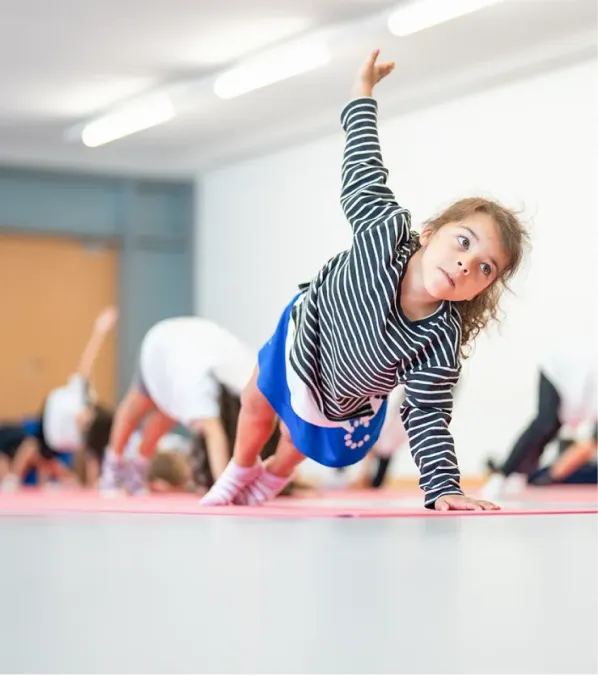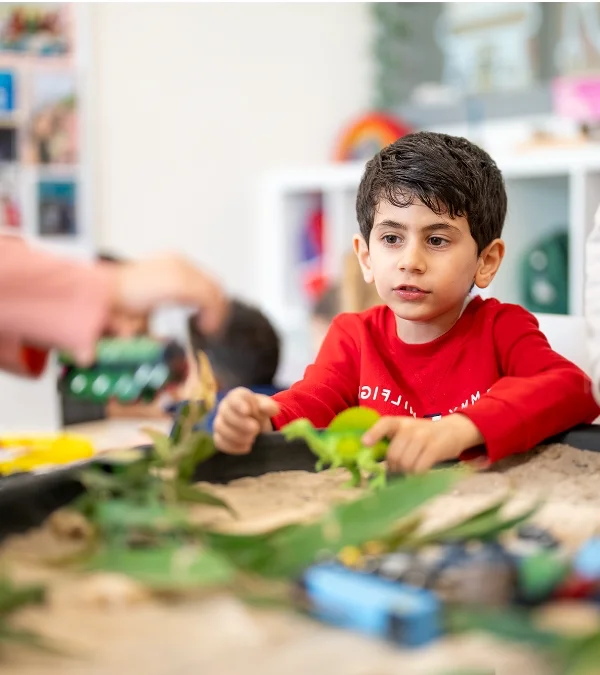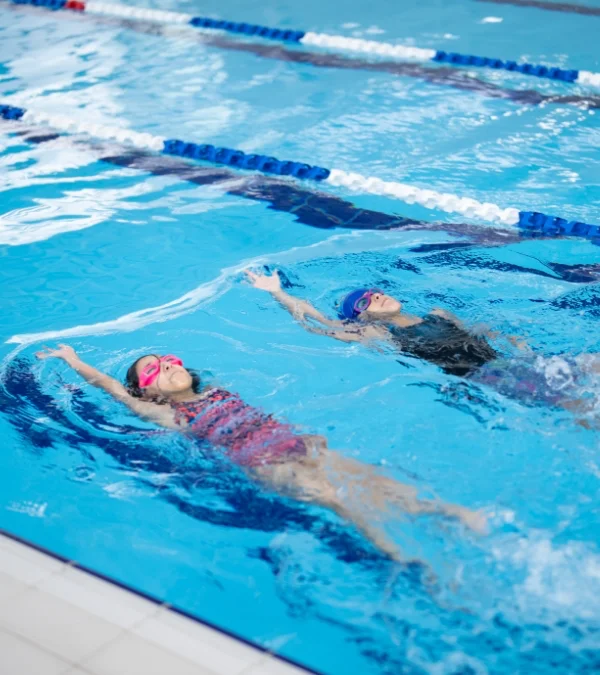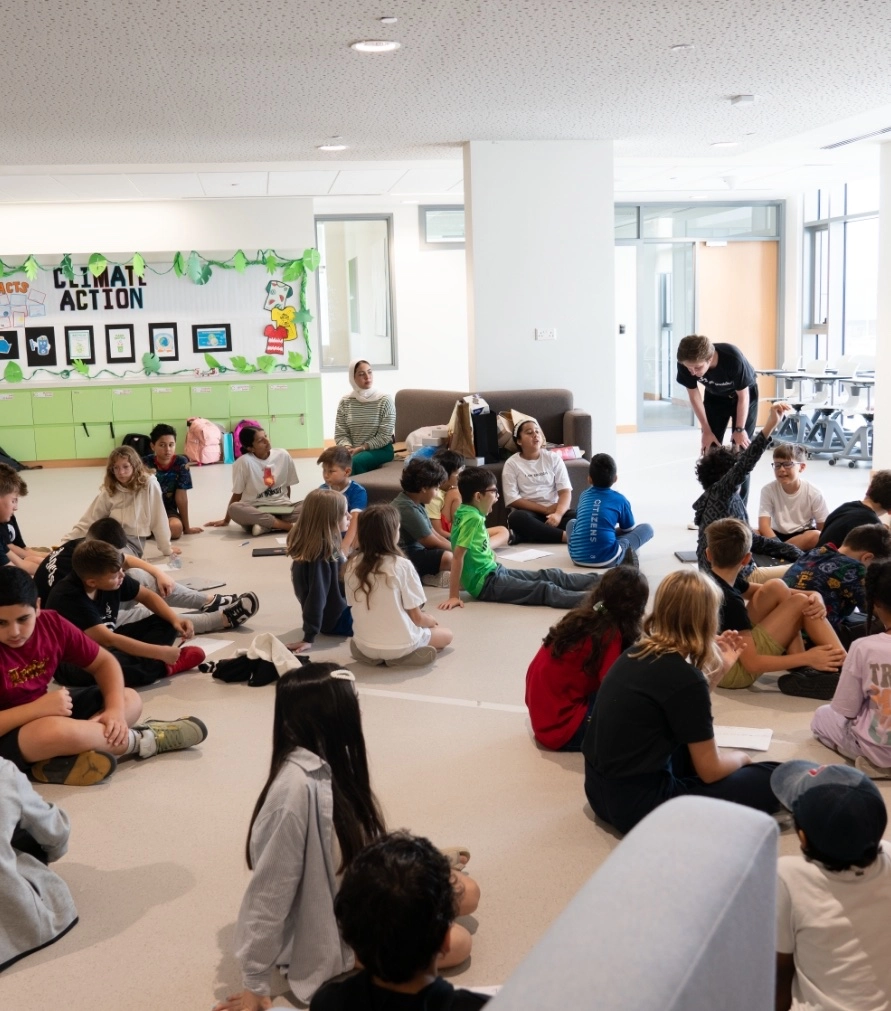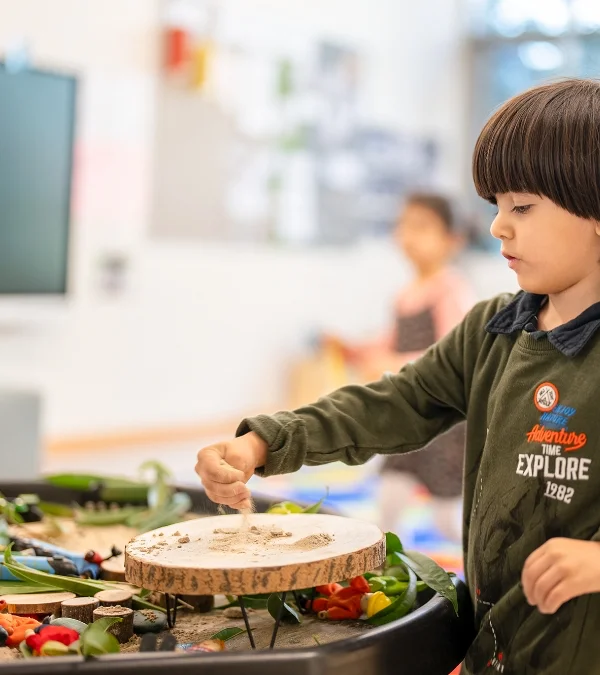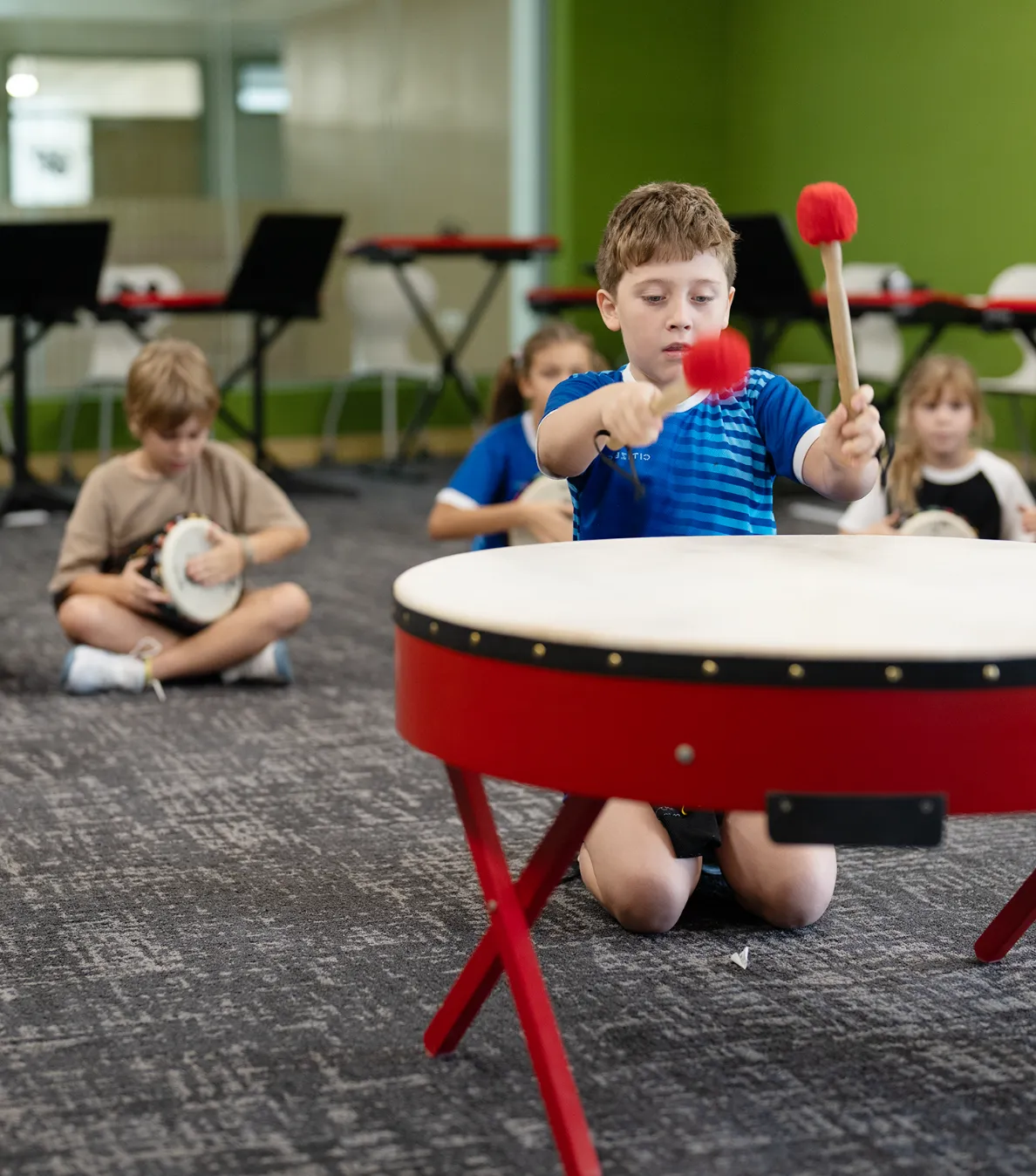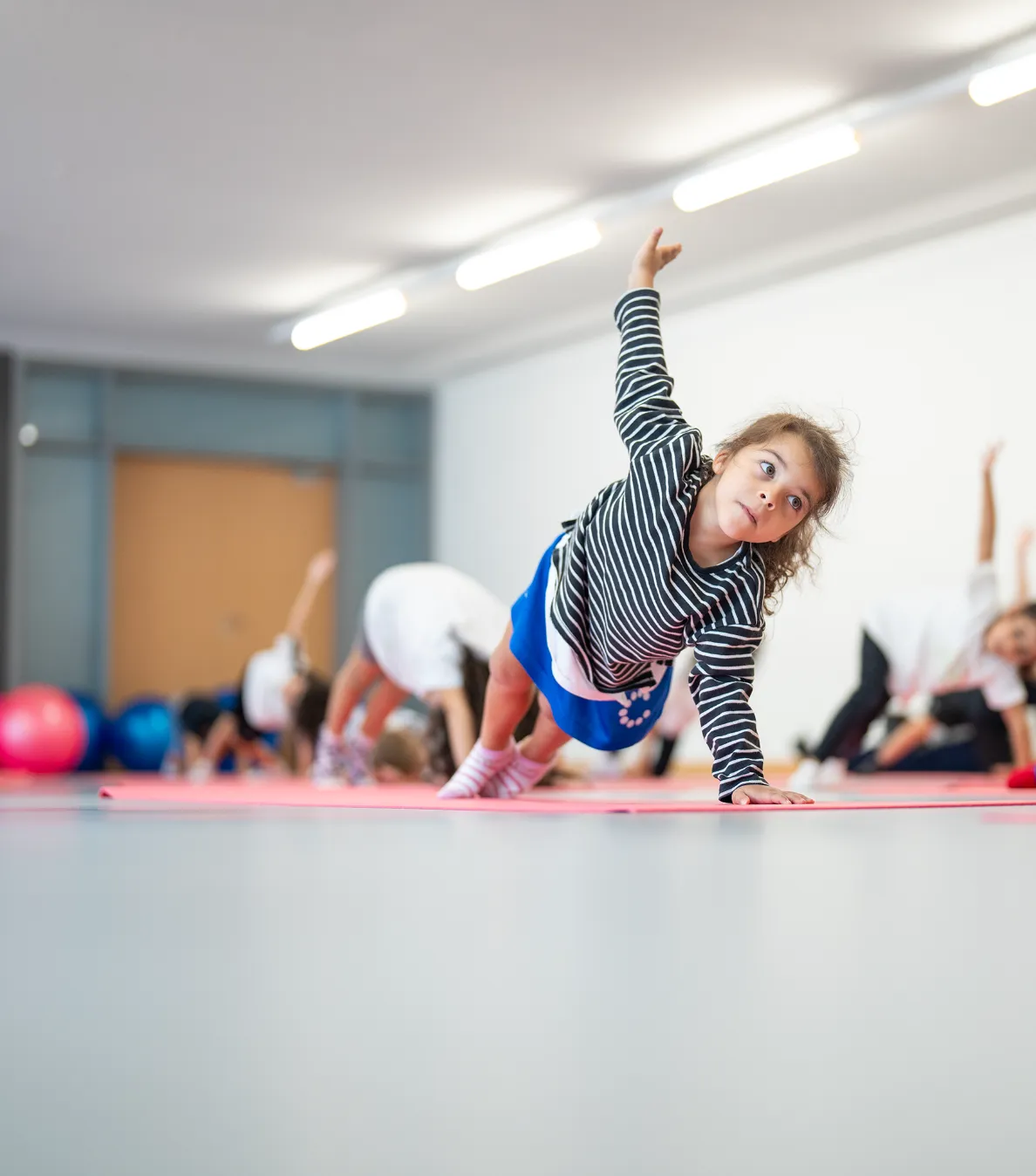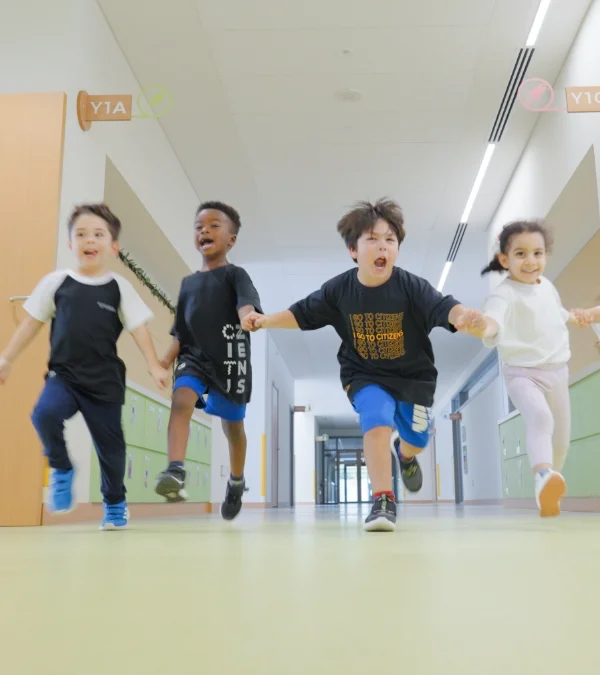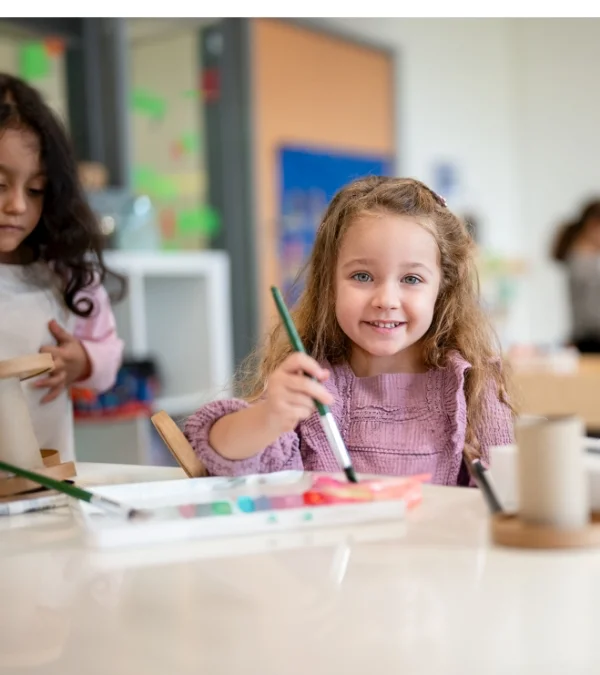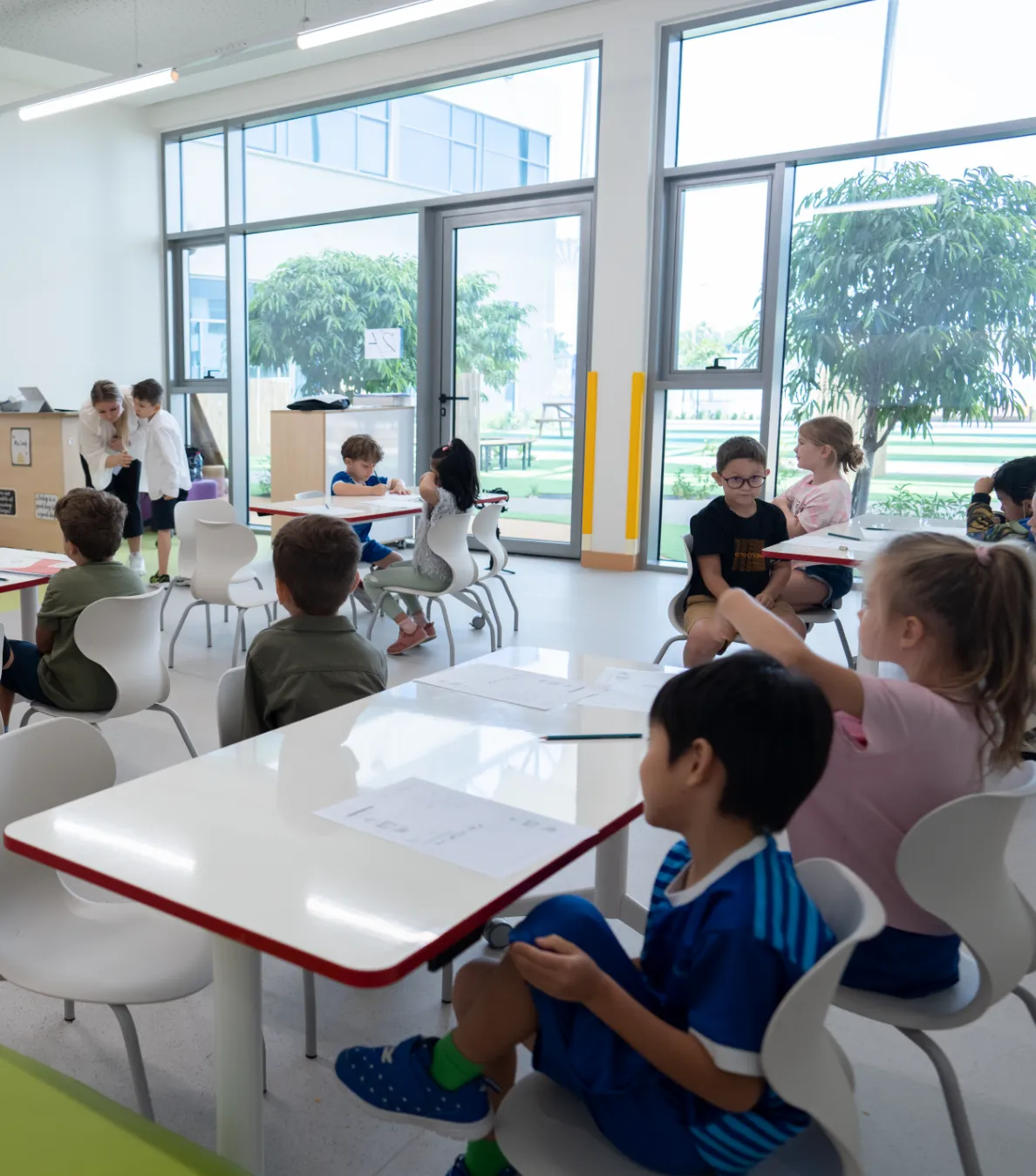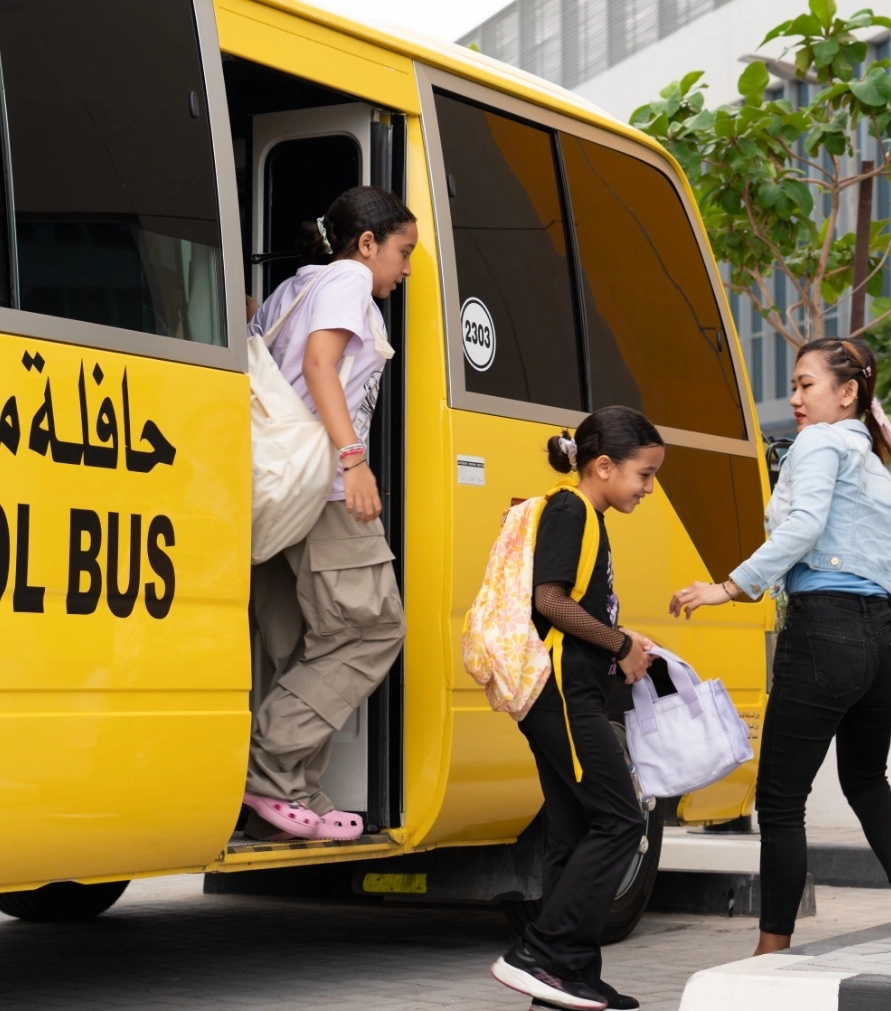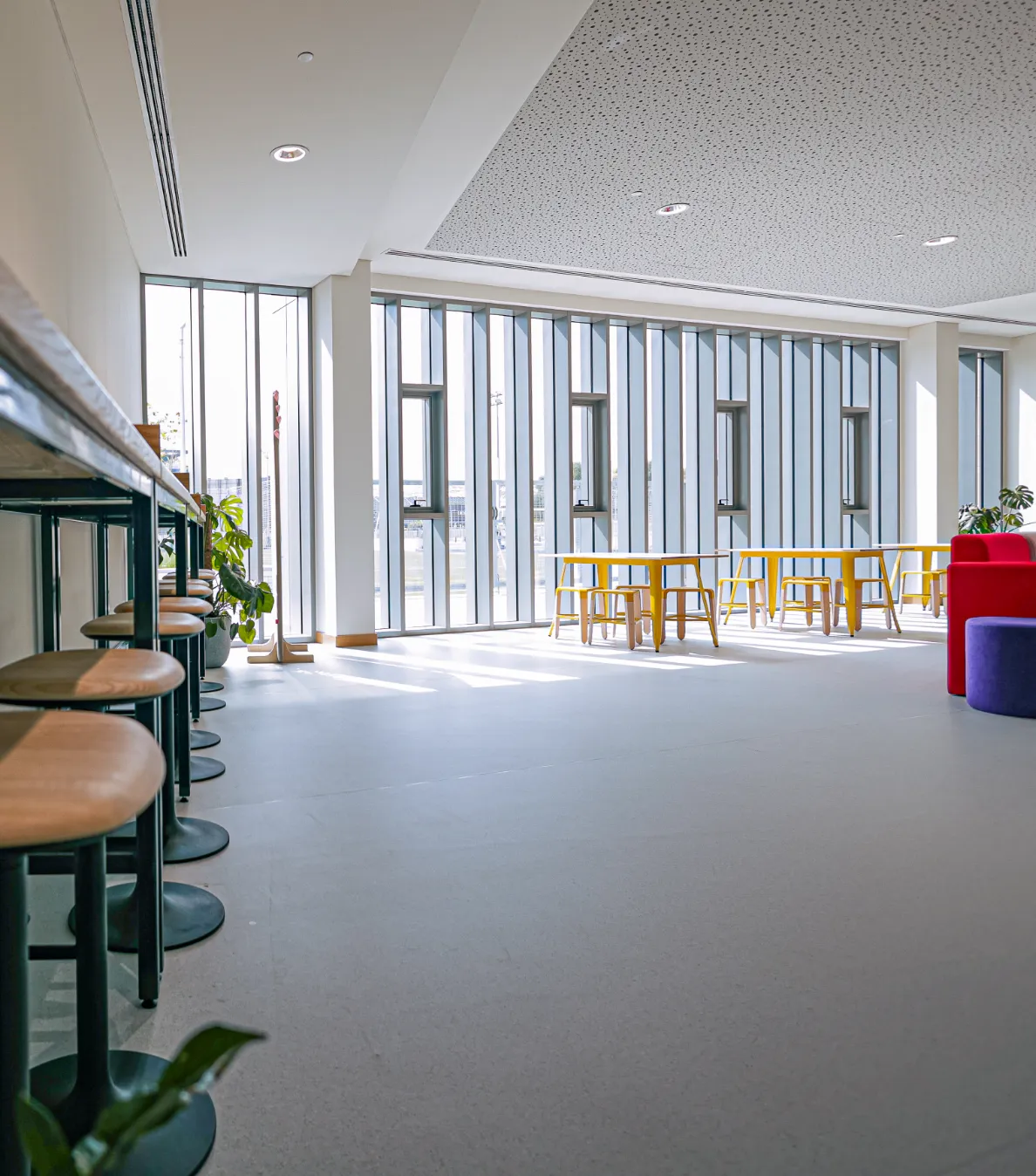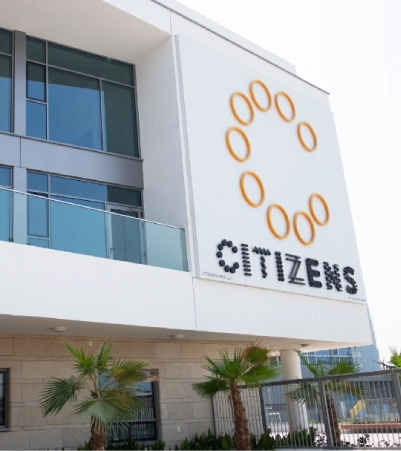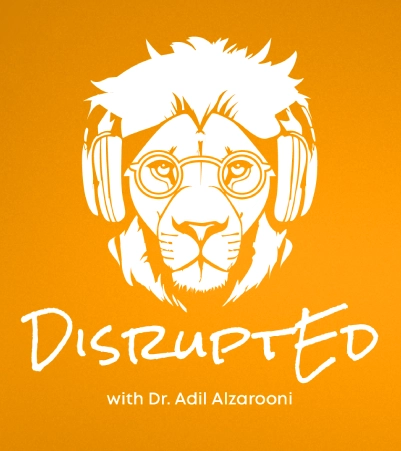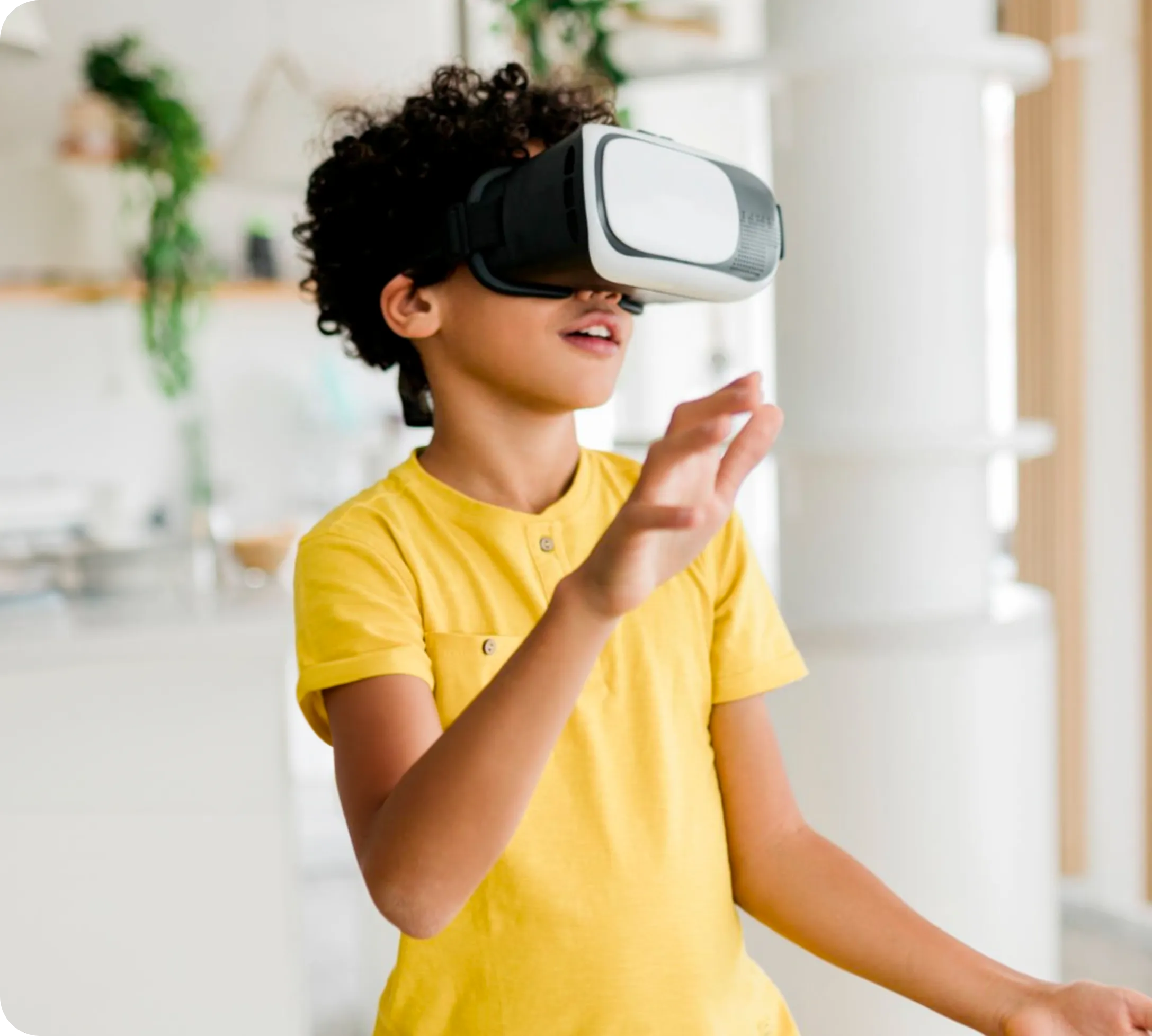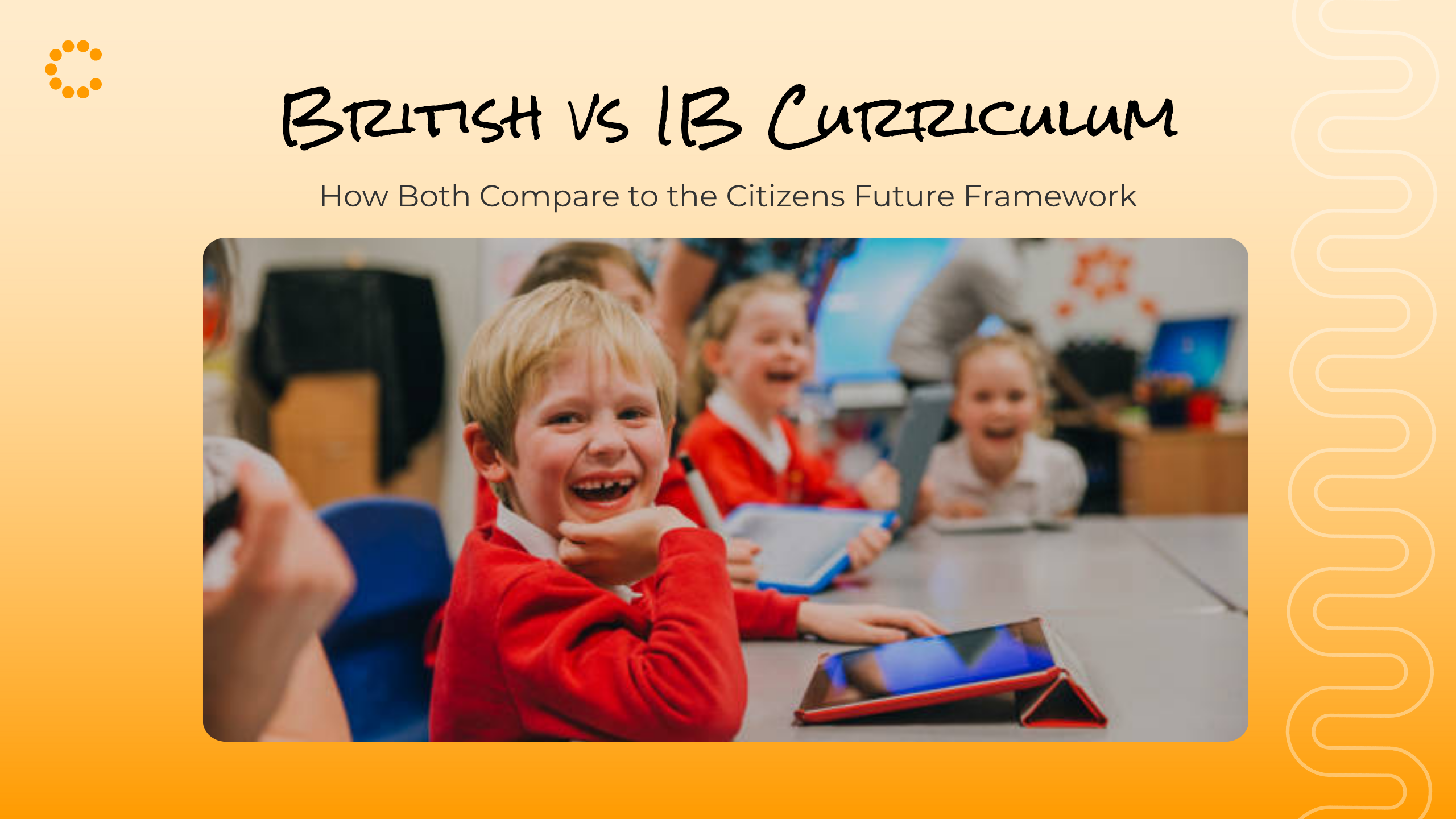
British vs IB Curriculum – and How Both Compare to the Citizens Future Framework
Choosing the best curriculum for expats in Dubai, for your child isn’t just about academics; it’s about shaping the way they think, grow, and engage with the world. In Dubai, two of the most popular options are the British Curriculum and the International Baccalaureate (IB). Each has its strengths, focus areas, and philosophies. However, as education evolves to meet the demands of a fast-changing world, Citizens School introduces a future-focused alternative, the Citizens Future Framework.
This article compares the British school curriculum vs international curriculum to help parents make a decision that aligns with their child’s strengths, values, and aspirations.
Understanding the Basics: British Curriculum, IB Curriculum, and the Citizens Offering
It is important for parents to understand what different curricula offer for their child and the benefits of each.
What is the British Curriculum?
The British Curriculum, also known as the UK National Curriculum, is built around clearly defined learning outcomes at every stage.
- Structure: Divided into Key Stages (KS1 to KS5), it provides a structured and sequential academic journey.
- Assessment Style: Emphasises high-stakes, standardised testing, including GCSEs and A-Levels.
- Focus: Academic rigour, subject mastery, and cumulative knowledge. Students are assessed based on predefined objectives.
This model is ideal for learners who thrive in structured environments and plan to pursue higher education in the UK or Commonwealth countries.
What is the IB Curriculum?
The International Baccalaureate is globally recognized for its emphasis on conceptual learning and global engagement.
- Programme Breakdown:
- Primary Years Programme (PYP): Designed for learners aged 3 to 12, the PYP nurtures curiosity and builds foundational skills through inquiry-based learning. It integrates subject areas into thematic units, encouraging students to explore ideas from multiple perspectives.
- Middle Years Programme (MYP): Aimed at learners aged 11 to 16, the MYP deepens academic engagement while promoting interdisciplinary thinking. It emphasizes intellectual challenge, service as action, and skills development that spans across traditional subjects.
- Diploma Programme (DP): For students aged 16 to 19, the DP is academically rigorous and internationally recognized for university admissions. It combines in-depth subject study with core components like the Theory of Knowledge (TOK), the Extended Essay (EE), and Creativity, Activity, Service (CAS), fostering independent research, critical reflection, and social responsibility.
- Learning Approach: The transdisciplinary nature of IB encourages students to make connections across subjects. This model cultivates learners who are not only knowledgeable but also capable of seeing the bigger picture and applying what they learn to the world around them.
- Assessment Philosophy: The IB replaces one-size-fits-all testing with a balanced approach to assessment. Continuous assessments, extended essays, and personal projects replace rote memorisation with inquiry and analysis. The focus is on deep comprehension and meaningful learning rather than rote memorisation.
What is the Citizens Offering?
Citizens School offers a distinctive blend of the British Curriculum’s academic structure with the inquiry-driven approach of the IB, creating a balanced, dynamic framework tailored to today’s learners.
- Framework Pillars: Built on the core pillars of agency, innovation, ethics, and global citizenship, the Citizens Future Framework fosters both personal and academic growth.
- Approach: Learning is interdisciplinary, personalised, and purpose-driven, allowing children to explore their interests while connecting knowledge across subjects in meaningful ways.
- Outcomes: The focus is on equipping learners with future-ready competencies, critical thinking, collaboration, ethical decision-making, and real-world problem-solving.
At Citizens, education goes beyond textbooks and tests. It’s about nurturing confident individuals, lifelong learners, and responsible leaders prepared to shape a changing world.
Teaching and Learning Approaches: Traditional vs Future-Oriented
The way students interact with learning in the classroom has a profound impact on their ability to understand, retain, and apply knowledge meaningfully.
Traditional education systems often follow a structured, syllabus-oriented model where teachers guide instruction through textbooks and predetermined objectives. This offers consistency and depth in core subjects but can limit opportunities for interdisciplinary exploration or creative application.
Other modern frameworks focus more on inquiry and thematic exploration. Learners are encouraged to ask questions, investigate, and make connections across different domains. This fosters engagement and ownership, shifting the learning experience from passive reception to active construction of knowledge.
Citizens School builds on this shift by embedding purpose into every aspect of learning. Education becomes a platform for impact, where learners explore challenges like food security by integrating science, digital technology, ethics, and social studies into one cohesive project. Students don’t just acquire knowledge; they use it to design change.
Assessment Process in Different Curricula
Assessment practices also reflect evolving understandings of student growth. In many systems, standardised exams serve as the primary measure of achievement. Others combine internal assessments, reflection, and final evaluations to capture a broader picture of progress.
At Citizens, assessment is integrated throughout the learning journey. Students develop portfolios, build prototypes, and present their work publicly, making learning visible, personal, and purposeful. Continuous formative feedback supports this process, complemented by structured internal and external evaluations to ensure rigour and transparency.
The Teacher’s Role in a Changing Learning Landscape
How educators engage with students shapes the entire learning environment. In more traditional settings, teachers are often content deliverers, focusing on structured instruction. In more progressive environments, educators act as facilitators, guiding students through inquiry and exploration.
At Citizens, the teacher’s role is redefined as that of a coach and co-designer. Educators collaborate with learners to co-create projects that align with personal interests and real-world contexts. This relationship fosters trust, nurtures curiosity, and promotes long-term motivation, laying the foundation for lifelong learning.
Skills for the Future in Each Curriculum
In a world defined by rapid change, education must prepare learners for more than exams. It must equip them with the tools to think critically, adapt quickly, and create confidently.
Many curricula prioritise foundational knowledge in literacy, numeracy, and core subjects. While essential, these competencies need to be paired with creativity, collaboration, and applied problem-solving. Some frameworks address this through reflective assignments, interdisciplinary projects, and community engagement, aiming to develop the whole child.
Citizens integrates these principles into every facet of the learning experience. The Citizens Future Framework centres on systems thinking, ethical reasoning, and innovation. Students work on real-world challenges through design sprints, simulations, or collaborative explorations that build resilience and creativity. Learners here don’t just study problems; they become solution creators.
Additionally, technology and leadership are not taught in isolation. Learners develop digital fluency by building apps, designing solutions, or presenting multimedia research. Leadership is embedded in experience, whether through project management, pitching to external stakeholders, or leading initiatives within their community.
The difference between British and international schools is their focus on authentic application. Learners intern with social enterprises, partner with non-profits, or lead sustainability campaigns. The outcomes are more than academic; they include confidence, agency, and a sense of purpose that extends far beyond the classroom.
Student Wellbeing, Identity, and Global Citizenship
Academic success cannot be isolated from emotional well-being and a strong sense of identity. An effective education model must address the intellectual, emotional, and social dimensions of student growth.
Some school systems such as include pastoral care and reflective practices, but the degree of emphasis on wellbeing can vary. Citizens places wellbeing at the centre of its philosophy. Every learner is supported by a dedicated mentor who guides not only academic progress but also personal growth and emotional resilience. This mentoring framework reflects the school’s foundational pillar, Everyone Known and Known Well, ensuring that every child feels seen, supported, and empowered.
When it comes to personal identity and belonging, the learning journey at Citizens is built around student voice and self-agency. Learners have the opportunity to shape their pathways, express their values, and engage with content that resonates with their passions. This emphasis on individual purpose cultivates self-awareness and inner confidence.
At Citizens, global citizenship is embedded in the culture, not just as a concept but as a lived practice. Learners participate in service projects, sustainability efforts, and global collaborations that teach them to act with empathy, integrity, and responsibility. They’re not just prepared to live in a globalised world; they’re prepared to lead in it.
Conclusion: Best Curriculum for Expats in Dubai.
For parents making curriculum choices, the question is no longer “Which system gets my child the best grades?” but rather, “Which learning environment prepares them best for the world ahead?” Because the reality is, it’s not about British school curriculum vs international curriculum; it is that the future will belong to those who can adapt, empathise, lead, and innovate, not just memorise.
The Citizens Future Framework acknowledges this shift. It’s built on the understanding that education must go beyond content mastery and foster curiosity, resilience, and creative problem-solving. It prepares learners not just for university but for life.
For parents, the decision ultimately comes down to alignment. Does the school reflect your child’s values and aspirations? Does it nurture their strengths while preparing them for the world they’ll inherit?
The Citizens Future Framework is more than a curriculum; it’s a commitment to personalised growth, purposeful learning, and global readiness. For many families, that may be exactly what education should be.
